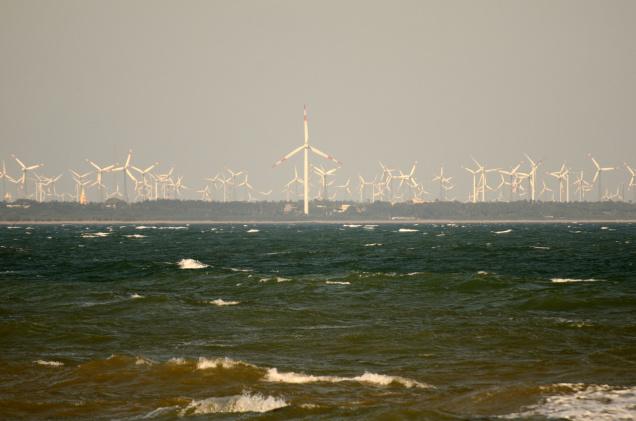ELEMENTS OF NATURE: Kanyakumari is indeed God’s own country. Photo: Lakshmi Sharath / The Hindu
The salts of the sea lure me as I can smell it from a distance. Here, in the confluence of three oceans, lies buried several myths, legends and stories. Kanyakumari has always been a mystery to me. Maybe it has something to do with the sea or the tale of the virgin goddess by the sea shore, but the town has never stopped fascinating me. Looking out of the window, I am lost in the many rotating windmills, dancing to the tune of the sea breeze, when I am interrupted by the laughter in the bus.
I join in the laughter as Sri Charanya, my travel companion, shares her memories of Kanyakumari when she visited the coastal town as a twelve year old. “You know, I was told that I could see red, black and blue colours here. The red was the Indian Ocean, blue the Bay of Bengal and black the Arabian Sea. I believed every word of it then,” she says as echoes of laughter drown her story. Memories come flooding back as I remember my first visit here as a wide-eyed twelve-year-old.
I am on a Naanjil Naadu tour organised by INTACH, travelling through small towns and villages around Nagercoil and Kanyakumari, visiting many temples, rock cut shrines, mosques, palaces and forts. While we alternate between facts and folk lore, we learn from a team of professors and historians accompanying us about the various dynasties that rule the region. I am of course fascinated by the many landscapes painted in front of me — natural, social , historical, political, spiritual, as I realise that what is today considered God’s own country has its origins right here in Naanjil Naadu, long before Kerala came into being.
We visit an ancient Chola temple dedicated to Shiva. Dr V Vedachalam, a retired epigraphist from Tamil Nadu Archaeology Department explains the architecture and draws our attention to the inscriptions and various cults of gods and goddesses. It is really God’s own country. The temples in this region are built by various kings across different eras and each one of them has left his stamp behind. From the Ay dynasty, to early Pandyas to the Venad kings, the land is steeped in cults. And I discover another 19th century cult right on the shores of a small fishing hamlet called Chinna Muttom.
While most of my travel companions are lost in the beauty around, a few of us walk down to a small shrine located on the rocky shores. A man in a turban is officiating as a priest as we gaze inside the sanctum and look at our hazy reflection with the sea forming our backdrop. There is no deity or idol — just a mirror which reflects and represents the soul or the Vishnu inside you. A small board in Tamil explains the philosophy about worshipping your body as the temple, with your mind at peace and devotion and purity in your soul. The belief rests in equality; every devotee is a king. Even Vivekananda, he claims, was influenced by it. The underlying thought is that you keep your mind and thoughts pure and worship the God inside you.
I later learn that the cult is referred to as Ayyavazhi, founded by a revolutionary called Ayya Vaikundar, also believed by his followers as a reincarnation of Vishnu. However , speaking to Ahi Mohan, coordinator of the Nadar Family Welfare centre in Trivandrum, I learn that he was a 19th century social reformer who was born in Kanyakumari district with a strong belief in equality of all people. He had built five main pathis, what we refer to as temples, and the 200-year-old pathi at Chinna Muttom was called Muthapathi. The followers believe that a dip in the sea will sanctify them.
I stand and gaze at my hazy reflection in the mirror for a long time and realise that my mind is blank, bathed by the ocean and purged of all thoughts. Elsewhere in the haze of white foam and fury of the waves, I can see a distant form of Sri Charanya calling out my name, holding some wet sand in her hands. As she comes closer, we both laugh. In her hands are lumps of black and brownish soil and the colours seem to merge with the blue of the ocean.
source: http://www.TheHindu.com / Life & Style> MetroPlus / by Lakshmi Sharath / February 03rd, 2012
